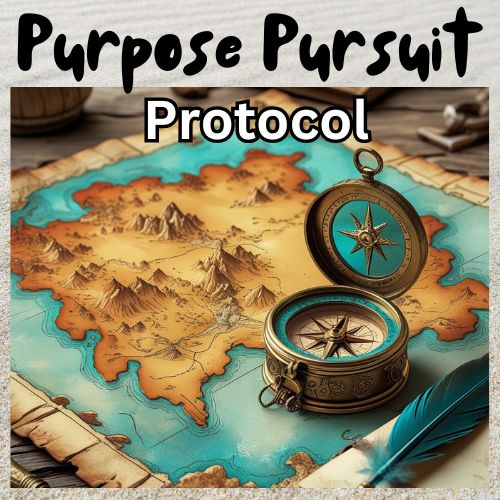I know, it sounds absurd, yet there you are, wide awake in the early morning hours, dragging yourself out of bed and wondering: why are we so obsessed with this grand quest?
Everything You Ever Wanted to Know about the Importance of Having a Life Purpose – nearly 4000 words, so go get a drink first (the latter is open to individual interpretation)
Too many words? Read the significantly shorter version below.
Introduction: A Knock at the Window
One overcast morning, Oliver, a rather conscientious if somewhat uninspired accountant, found himself startled by a sharp tapping on his living room window. Much to his surprise, the perpetrator wasn’t a wayward bird or a curious child, but a well-fed squirrel wearing what appeared to be a monocle and a tweed cap. The squirrel, who would later introduce himself as Sir Nuttingham, pointed an acorn at Oliver and said, with perfect diction, “You, sir, are destined for more than mindnumbing spreadsheets.”
Now, squirrels don’t generally speak, much less offer unsolicited life advice, but this unexpected visitation had a lasting effect. Oliver began to question whether his routine existence truly captured the essence of what he was meant to do in this life. And so began his journey toward that most modern of all obsessions: finding his life purpose.
Sir Nuttingham may be fictional (I hope), but Oliver’s existential itch is very real and very human. Across cultures and contexts, people are increasingly preoccupied with this abstract notion of a “life purpose.”
Why is that?
Let’s explore the deeper psychological, sociological, and even evolutionary roots of this widespread obsession and consider how we might engage with it in a more meaningful way.
The Existential Imperative: Making Meaning in a Chaotic World
From a psychological standpoint, the search for purpose is deeply tied to our need for existential security. Unlike other species, humans have the unique capacity for self-reflection and foresight. We are not only aware of our mortality, but also of the fact that our time is limited, unpredictable, and ultimately finite.
This awareness creates a psychological tension. How do we justify our presence here? What makes our lives matter?
Purpose becomes a salve for this existential anxiety. It acts as a narrative thread that stitches together the disparate events of our lives into a cohesive whole. Whether your personal myth involves changing the world, raising a family, writing a novel, or rescuing retired racehorses, the point is the same: purpose helps us organise our experience into a meaningful story.
Viktor Frankl, the Austrian psychiatrist and Holocaust survivor, argued that the primary drive in human beings is not pleasure (as Freud asserted) or power (as Adler believed), but meaning. In his classic work Man’s Search for Meaning, Frankl writes, “Life is never made unbearable by circumstances, but only by lack of meaning and purpose.”
Oliver didn’t abandon spreadsheets because they were inherently meaningless—they served a function, after all. He abandoned them because they didn’t connect to a deeper personal narrative. It’s hard to rally your energy around vague notions like “be a good person.” But tell Oliver he’s meant to finance art classes for underprivileged youth, and suddenly his spreadsheet sessions take on new meaning. Purpose gives us fuel: every late-night project and awkward networking coffee date suddenly feels worthwhile. Once Oliver reimagined himself as a champion of underfunded artists, his work gained resonance beyond the balance sheet.
The Motivational Engine: Why Purpose Fuels Progress
Purpose also serves a practical function: it galvanises us. When we believe our efforts contribute to something larger than ourselves, we are more resilient, focused, and motivated.
This isn’t just feel-good philosophy; it’s science. Studies in positive psychology consistently show that individuals with a clearly articulated sense of purpose enjoy higher levels of well-being, lower levels of depression and anxiety, and even improved physical health. Purpose is associated with better sleep, stronger immune function, and greater longevity.
Purpose helps us endure hardship. Consider how much easier it is to persist through challenges when you know what you’re working toward. Purpose acts as an internal compass that keeps us aligned even when the road is rough. It transforms effort into intention.
Oliver’s late nights spent researching community grants and mentoring young artists might have once seemed like burdens. But reframed through the lens of purpose, they became expressions of selfhood—acts of alignment.
The Cultural Overlay: How Society Shapes the Quest
While the psychological drivers of purpose are universal, the way we interpret and pursue it is heavily influenced by culture.
Western societies, particularly in the post-industrial age, place a strong emphasis on individualism, self-actualisation, and personal fulfilment. The notion of a singular, discoverable “life purpose” aligns with the broader cultural narrative that life should be not just lived, but optimised.
Media and marketing amplify this ideal. Social media feeds are saturated with success stories, transformation arcs, and inspirational quotes urging us to “find our why.” TED Talks, bestselling books, and personal development courses promise to unlock the secret of fulfilment in 10 easy steps. We are led to believe that everyone has a hidden calling just waiting to be unearthed, like a golden idol in a jungle temple.
Of course, the reality is more nuanced. Not every life purpose is glamorous or immediately evident. For some, it might be the quiet dedication to caregiving, or the tireless pursuit of justice, or the creation of a nurturing home. These purposes don’t always trend online, but they matter profoundly.
Identity and Belonging: The Social Roots of Purpose
Purpose also serves a social function: it gives us an identity and a place in the world.
We often define ourselves by what we do and why we do it. Statements like “I’m a teacher because I believe in shaping young minds,” or “I’m an entrepreneur driven to solve problems” aren’t just career descriptions—they’re expressions of value systems and personal missions.
When we can articulate our purpose, we are better able to connect with others who share our values. Purpose fosters belonging. It draws us into communities and circles of influence where our sense of meaning is reinforced and supported.
Oliver, who once kept to himself in the breakroom, found new camaraderie among artists and creative professionals. His new identity as a financial supporter of the arts gave him a social anchor and a sense of contribution.
Evolutionary Echoes: Ancient Drives in Modern Packaging
Even from an evolutionary standpoint, the obsession with purpose makes sense. In ancestral environments, clearly defined roles enhanced survival. The hunter, the healer, the storyteller—each contributed to the group’s cohesion and effectiveness.
This role-based structure not only ensured material survival but also provided psychological security. When you know your role and your contribution is valued, you feel integrated and necessary. Those ancient instincts still linger in our modern psyches. We may no longer forage or make fire, but we still crave the feeling of being needed.
Our obsession with purpose may be the evolutionary drive for relevance, rebranded for the digital age.
While striving for purpose can be empowering, it can also lead to frustration if the goal feels out of reach. It’s helpful to:
- Frame Purpose as a Journey: View it as an evolving process rather than a fixed endpoint.
- Cultivate Micro-Purposes: Identify small, bite-sized goals—helping a friend, learning a skill—that nourish daily meaning.
A Word of Caution: The Purpose Trap
While the pursuit of purpose can be enriching, it also carries risks. When we turn purpose into a performance metric or a branding exercise, we risk hollowing it out. The pressure to identify one grand, all-encompassing purpose can lead to paralysis, perfectionism, or feelings of inadequacy.
Moreover, purpose doesn’t have to be fixed. It can evolve. It can be plural. And it can reside in the ordinary.
We might do well to follow the Japanese concept of ikigai, which loosely translates to “reason for being.” Rather than a single, dramatic mission, ikigai is often found at the intersection of what we love, what we’re good at, what the world needs, and what we can be paid for. It suggests that meaning emerges from the interplay of daily actions and long-term values.
For Oliver, purpose wasn’t a bolt from the blue. It was a gradual accumulation of insights, interactions, and inclinations—refined over time, with space for detours.
Conclusion: The Ongoing Journey
So why are we so obsessed with finding our life purpose?
Because we are human. Because we crave meaning, motivation, identity, and connection. Because our minds are wired to search for narrative coherence, and our hearts are wired to want to matter.
But perhaps the better question is not, “What is my purpose?” but rather, “What can I do today that feels meaningful, aligned, and contributory?”
And if, in the process, a squirrel in tweed shows up at your window with an acorn and a monocle—listen closely. You never know where your next breadcrumb of purpose might come from.
Forget about that Facelift. Find Your Purpose instead.
Science is catching up to what your soul already knows: purpose is the ultimate anti-ageing serum. It sharpens your mind, strengthens your body, and gives your days that youthful zing no “miracle “cream can deliver.
Curious what your purpose is? No need to wait for a talking squirrel to whisper it in your ear. Enrol in The Purpose Pursuit Protocol online experience—a science-backed, soul-aligned course – and coaching program designed to help you unearth your unique reason for being… and actually do something with it.
Whether you’re feeling stuck, sparked, or somewhere in between, this course delivers practical tools, profound insights, and a clear, doable path to live with more courage, creativity, and clarity.
Purpose isn’t just poetic—it’s rejuvenating. Let’s find yours.
Click here to learn more and enroll in The Purpose Pursuit Protocol.
The Purpose Pursuit Protocol -a proven, structured process designed and tailor-made specifically for high-achievers who refuse to settle for surface-level success. We strip away the noise, the expectations, the external definitions of “making it,” and get to the core of what actually drives you. The work that electrifies you. The contribution that makes your life matter.


“I am an experienced medical doctor – MBChB, MRCGP, NLP master pract cert, Transformational Life Coach (dip.) Life Story Coach (cert.) Stress Counselling (cert.) Med Hypnotherapy (dip.) and EAGALA (cert.) I may have an impressive number of letters after my name, and more than three decades of professional experience, but what qualifies me to excel at what I do is my intuitive understanding of my clients’ difficulties and my extensive personal experience of managing major life changes using strategies I developed over many years.” Dr M Montagu

